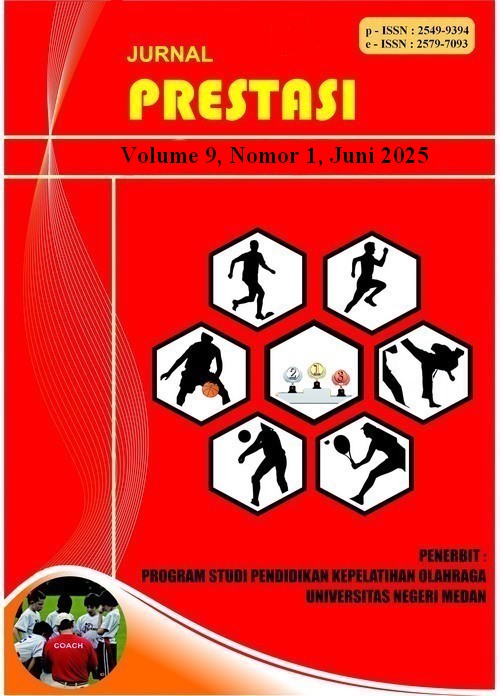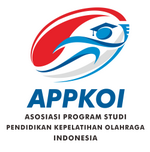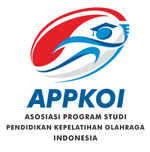KECERDASAN EMOSIONAL DAN PRESTASI BELAJAR SISWA SEKOLAH MENENGAH PERTAMA DI MERAUKE: STUDI KORELASIONAL DALAM KONTEKS PENDIDIKAN MULTIKULTURAL
DOI:
https://doi.org/10.24114/jp.v9i1.66321Keywords:
Kecerdasan emosional, Prestasi belajar, Pendidikan multicultural, Hubungan korelasional, Regulasi emosi akademikAbstract
Penelitian ini bertujuan untuk menganalisis hubungan antara kecerdasan emosional dan prestasi belajar siswa Sekolah Menengah Pertama (SMP) di Merauke, Papua Selatan, dalam konteks pendidikan multikultural. Dengan menggunakan pendekatan kuantitatif dan metode korelasional, penelitian ini menjelaskan sejauh mana kecerdasan emosional sebagai variabel independen memengaruhi capaian akademik siswa dalam mata pelajaran Pendidikan Jasmani, Olahraga, dan Kesehatan (PJOK). Populasi penelitian terdiri dari siswa kelas VIII di tiga SMP negeri yang merepresentasikan keberagaman sosial dan budaya. Sampel sebanyak 210 siswa diperoleh melalui teknik stratified random sampling. Instrumen pengumpulan data berupa angket tertutup berdasarkan lima dimensi kecerdasan emosional menurut Daniel Goleman, dan nilai rapor PJOK sebagai indikator prestasi belajar. Analisis data dilakukan melalui uji korelasi Pearson dan regresi linier sederhana. Hasil penelitian menunjukkan adanya hubungan positif dan signifikan antara kecerdasan emosional dan prestasi belajar siswa. Dimensi motivasi dan pengendalian diri terbukti memberikan pengaruh dominan terhadap capaian akademik. Konteks multikultural Merauke juga memperkuat pentingnya kemampuan adaptasi sosial dan empati dalam lingkungan belajar yang heterogen. Temuan ini menegaskan bahwa kecerdasan emosional merupakan faktor psikologis strategis dalam mendukung keberhasilan belajar siswa di wilayah multikultural. Implikasi praktis dari penelitian ini adalah perlunya integrasi program pengembangan kecerdasan emosional berbasis budaya dalam kurikulum sekolah sebagai strategi peningkatan kualitas pendidikan. Penelitian ini memberikan kontribusi terhadap pengembangan model pembelajaran yang responsif terhadap dinamika sosial-budaya lokal.References
Alanazi, S. A., Shabbir, M., Alshammari, N., Alruwaili, M., Hussain, I., & Ahmad, F. (2023). Prediction of emotional empathy in intelligent agents to facilitate precise social interaction. Applied Sciences, 13(2), 1163.
Chung, S. R., Cichocki, M. N., & Chung, K. C. (2023). Building emotional intelligence. Plastic and Reconstructive Surgery, 151(1), 1–5.
Dong, X., Kalugina, O. A., Vasbieva, D. G., & Rafi, A. (2022). Emotional intelligence and personality traits based on academic performance. Frontiers in Psychology, 13, 894570.
Getahun Abera, W. (2023). Emotional intelligence and pro-social behavior as predictors of academic achievement among university students. Community Health Equity Research & Policy, 43(4), 431–441.
Halimi, F., AlShammari, I., & Navarro, C. (2021). Emotional intelligence and academic achievement in higher education. Journal of Applied Research in Higher Education, 13(2), 485–503.
Herut, A. H., Muleta, H. D., & Lebeta, M. F. (2024). Emotional intelligence as a predictor for academic achievement of children: Evidence from primary schools of southern Ethiopia. Social Sciences & Humanities Open, 9, 100779.
Hossain, K. I. (2024). Reviewing the role of culture in English language learning: Challenges and opportunities for educators. Social Sciences & Humanities Open, 9, 100781.
Iqbal, J., Asghar, M. Z., Ashraf, M. A., & Yi, X. (2022). The impacts of emotional intelligence on students’ study habits in blended learning environments: the mediating role of cognitive engagement during COVID-19. Behavioral Sciences, 12(1), 14.
Kim, S.-H., & Shin, S. (2021). Social–emotional competence and academic achievement of nursing students: A canonical correlation analysis. International Journal of Environmental Research and Public Health, 18(4), 1752.
Lakkala, S., Galkienė, A., Navaitienė, J., Cierpiałowska, T., Tomecek, S., & Uusiautti, S. (2021). Teachers supporting students in collaborative ways—An analysis of collaborative work creating supportive learning environments for every student in a school: Cases from Austria, Finland, Lithuania, and Poland. Sustainability, 13(5), 2804.
Li, S., Tang, Y., & Zheng, Y. (2023). How the home learning environment contributes to children’s social–emotional competence: A moderated mediation model. Frontiers in Psychology, 14, 1065978.
Ma, C., & Zhou, W. (2022). Effects of unfolding case-based learning on academic achievement, critical thinking, and self-confidence in undergraduate nursing students learning health assessment skills. Nurse Education in Practice, 60, 103321.
Makweya, P. P., & Sepadi, M. (2025). The Crucial Role of Empathy in Fostering Inclusive Learning Environments. In Global Practices in Inclusive Education Curriculum and Policy (pp. 77–90). IGI Global.
Mlodzianowska, S., Olivos Rossini, M., & Singh Manhas, P. (2024). International Collaboration Through Online Learning Between Students from Peru and India. Journal of Teaching in International Business, 35(1–2), 20–49.
Mohamed, M. G., Al-Yafeai, T. M., Adam, S., Hossain, M. M., Ravi, R. K., Jalo, F. M., & Osman, A. E. (2025). The significance of emotional intelligence in academic stress, resilience, and safe transition from high school to university: An SEM analysis among Northern Emirati university students. Global Transitions, 7, 109–117.
Pelikan, E. R., Korlat, S., Reiter, J., Holzer, J., Mayerhofer, M., Schober, B., Spiel, C., Hamzallari, O., Uka, A., & Chen, J. (2021). Distance learning in higher education during COVID-19: The role of basic psychological needs and intrinsic motivation for persistence and procrastination–a multi-country study. PloS One, 16(10), e0257346.
Rivera-Pérez, S., Fernandez-Rio, J., & Iglesias Gallego, D. (2021). Effects of an 8-week cooperative learning intervention on physical education students’ task and self-approach goals, and emotional intelligence. International Journal of Environmental Research and Public Health, 18(1), 61.
Shafait, Z., Khan, M. A., Sahibzada, U. F., Dacko-Pikiewicz, Z., & Popp, J. (2021). An assessment of students’ emotional intelligence, learning outcomes, and academic efficacy: A correlational study in higher education. Plos One, 16(8), e0255428.
Sook Khuan, W., & Chai Lin, P. K. (2021). Emotional intelligence as predictor of students’ academic performance. ESTEEM Journal of Social Sciences and Humanities, 5(1), 56–66.
Trish, S. (2023). The role of Emotional Intelligence in Education: fostering Social and Emotional Learning in Schools. Journal of Advanced Research in Education, 2(5), 19–33.
Vila, S., Gilar-Corbí, R., & Pozo-Rico, T. (2021). Effects of student training in social skills and emotional intelligence on the behaviour and coexistence of adolescents in the 21st century. International Journal of Environmental Research and Public Health, 18(10), 5498.
Yang, Y.-D., Zhou, C.-L., & Wang, Z.-Q. (2024). The relationship between self-control and learning engagement among Chinese college students: the chain mediating roles of resilience and positive emotions. Frontiers in Psychology, 15, 1331691.
Downloads
Published
Issue
Section
License
Copyright (c) 2025 Pulung Riyanto, Heri Yusuf Muslihin

This work is licensed under a Creative Commons Attribution-ShareAlike 4.0 International License.
Authors who publish with this journal agree to the following terms:
- Authors retain copyright and grant the journal right of first publication with the work simultaneously licensed under a Creative Commons Attribution License that allows others to share the work with an acknowledgment of the work's authorship and initial publication in this journal.
- Authors are able to enter into separate, additional contractual arrangements for the non-exclusive distribution of the journal's published version of the work (e.g., post it to an institutional repository or publish it in a book), with an acknowledgment of its initial publication in this journal.
- Authors are permitted and encouraged to post their work online (e.g., in institutional repositories or on their website) prior to and during the submission process, as it can lead to productive exchanges, as well as earlier and greater citation of published work (See The Effect of Open Access).
- This work is licensed under a Creative Commons Attribution-ShareAlike 4.0 International License.























